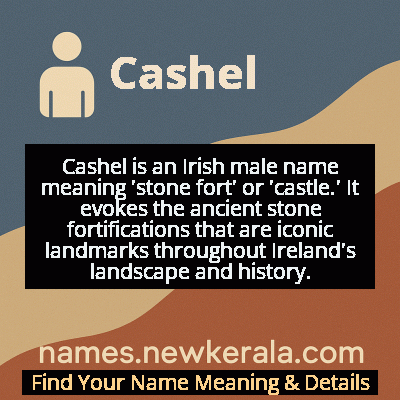Cashel Name Meaning & Details
Origin, Popularity, Numerology Analysis & Name Meaning of Cashel
Discover the origin, meaning, and cultural significance of the name CASHEL. Delve into its historical roots and explore the lasting impact it has had on communities and traditions.
Name
Cashel
Gender
Male
Origin
Irish
Lucky Number
3
Meaning of the Name - Cashel
Cashel is an Irish male name meaning 'stone fort' or 'castle.' It evokes the ancient stone fortifications that are iconic landmarks throughout Ireland's landscape and history.
Cashel - Complete Numerology Analysis
Your Numerology Number
Based on Pythagorean Numerology System
Ruling Planet
Jupiter
Positive Nature
Optimistic, inspirational, and creative.
Negative Traits
Scattered, exaggerating.
Lucky Colours
Yellow, gold, purple.
Lucky Days
Thursday.
Lucky Stones
Yellow sapphire.
Harmony Numbers
1, 2, 9.
Best Suited Professions
Arts, writing, communication.
What People Like About You
Creativity, optimism.
Famous People Named Cashel
Cashel O'Reilly
Irish chieftain
Leader of the O'Reilly clan in County Cavan, known for resisting English rule
Cashel Moore
Actor
Irish actor known for roles in independent films and theater productions
Cashel O'Connell
Historian
Author of several books on Irish medieval architecture and stone fortifications
Name Variations & International Equivalents
Click on blue names to explore their detailed meanings. Gray names with will be available soon.
Cultural & Historical Significance
Many of these cashels were built between the 5th and 12th centuries and served as royal sites, monasteries, and defensive structures, making the name inherently tied to Irish identity and resilience. The Rock of Cashel specifically was the traditional seat of the Kings of Munster for hundreds of years before being donated to the Church, further cementing its importance in Irish history and creating a powerful symbol of Ireland's complex relationship between secular and religious authority throughout the centuries.
Extended Personality Analysis
Individuals named Cashel are often perceived as strong, grounded, and reliable, much like the stone fortifications their name references. They tend to possess a natural leadership quality and a protective instinct toward those they care about, reflecting the defensive nature of ancient cashels. Their personality often combines traditional values with modern adaptability, creating individuals who respect heritage while embracing progress.
Cashels are typically seen as dependable friends and family members who provide stability and security in relationships. They often exhibit patience and endurance in facing life's challenges, with a quiet strength that others find comforting and reassuring. While they may appear reserved at first, they reveal deep loyalty and warmth to those who earn their trust, and they often become the cornerstone of their social and family circles, much like the central role cashels played in ancient Irish communities.
Modern Usage & Popularity
In contemporary times, Cashel remains a distinctly Irish name that has maintained steady but modest usage, primarily within Ireland and among the Irish diaspora. It's considered a strong, traditional choice that honors Irish heritage without being overly common. The name has seen a slight increase in popularity in recent years as parents seek unique yet meaningful names with cultural significance, particularly those connected to Irish history and architecture. While not among the top 100 names in Ireland or other English-speaking countries, it maintains a consistent presence and is particularly favored by families with strong connections to Irish history or those appreciating its architectural and historical connotations.
Symbolic & Spiritual Meanings
Symbolically, Cashel represents strength, protection, and enduring legacy. Like the stone forts it references, the name conveys a sense of permanence and resilience against the tests of time. It symbolizes the intersection of spiritual and temporal power, reflecting how ancient cashels served both religious and political purposes. The name also carries connotations of heritage and cultural continuity, representing the unbroken connection between modern Ireland and its ancient past, while metaphorically suggesting a person who provides shelter and security to others while standing firm in their convictions and values.

